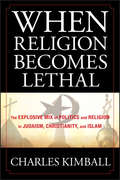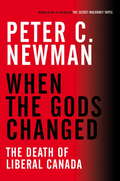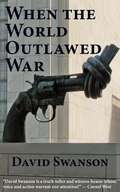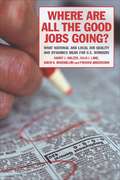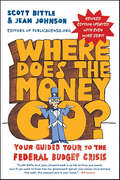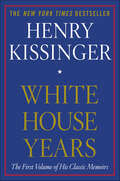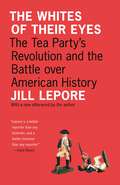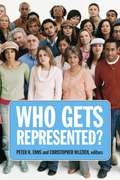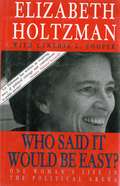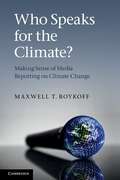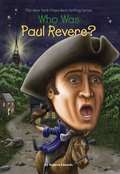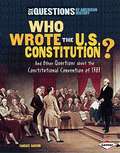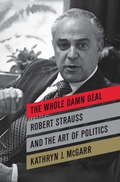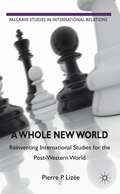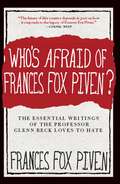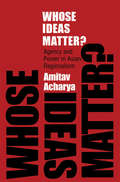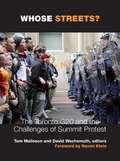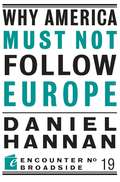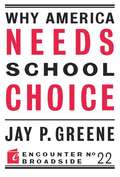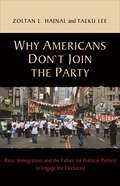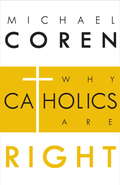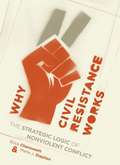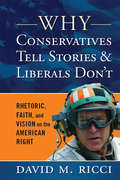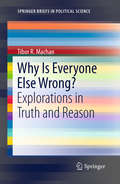- Table View
- List View
When Religion Becomes Lethal
by Charles KimballA compelling look at today's complex relationship between religion and politics In his second book, bestselling author Charles Kimball addresses the urgent global problem of the interplay between fundamentalist Abrahamic religions and politics and moves beyond warning signs (the subject of his first book) to the dangerous and lethal outcomes that their interaction can produce. Drawing on his extensive personal and professional knowledge of, experience with and access to all three traditions, Kimball's explanation of the multiple ways religion and politics interconnect within Judaism, Christianity, and Islam will illuminate the problems and give readers a hopeful vision for how to chart a safer course into a precarious future. Kimball is the author of When Religion Becomes Evil, one of the most acclaimed post 9/11 books on terrorism and religion Reveals why religion so often leads to deadly results The author has scholarly knowledge and expertise and extensive personal experience with the peoples, cultures, and leaders involved Readable and engaging, this book gives a clear picture of today's complex political and religious reality and offers hope for the future.
When the Gods Changed
by Peter C. NewmanPeter C. Newman, Canada's most "cussed and discussed" political journalist, on the death spiral of the Liberal Party.The May 2, 2011 federal election turned Canadian governance upside down and inside out. In his newest and possibly most controversial book, bestselling author Peter C. Newman argues that the Harper majority will alter Canada so much that we may have to change the country's name. But the most lasting impact of the Tory win will be the demise of the Liberal Party, which ruled Canada for seven of the last ten decades and literally made the country what it is. Newman chronicles, in bloody detail, the de-construction of the Grits' once unassailable fortress and anatomizes the ways in which the arrogance embedded in the Liberal genetic code slowly poisoned the party's progressive impulses. When the Gods Changed is the saga of a political self-immolation unequalled in Canadian history. It took Michael Ignatieff to light the match. (From the Hardcover edition.)
When the World Outlawed War
by David SwansonThis is a masterful account of how people in the United States and around the world worked to abolish war as a legitimate act of state policy and won in 1928, outlawing war with a treaty that is still on the books. Swanson's account of the successful work of those who came before us to insist that war be outlawed points us toward new ways of thinking about both war and political activism.
Where Are All the Good Jobs Going?: What National and Local Job Quality and Dynamics Mean for U.S. Workers
by David B. Rosenblum Fredrik Andersson Harry J. Holzer Julia I LaneDeindustrialization in the United States has triggered record-setting joblessness in manufacturing centers from Detroit to Baltimore. At the same time, global competition and technological change have actually stimulated both new businesses and new jobs. The jury is still out, however, on how many of these positions represent a significant source of long-term job quality and security. Where Are All the Good Jobs Going? addresses the most pressing questions for today’s workers: whether the U.S. labor market can still produce jobs with good pay and benefits for the majority of workers and whether these jobs can remain stable over time. What constitutes a “good” job, who gets them, and are they becoming more or less secure? Where Are All the Good Jobs Going? examines U.S. job quality and volatility from the perspectives of both workers and employers. The authors analyze the Longitudinal Employer Household Dynamics (LEHD) data compiled by the U.S. Census Bureau, and the book covers data for twelve states during twelve years, 1992–2003, resulting in an unprecedented examination of workers and firms in several industries over time. Counter to conventional wisdom, the authors find that good jobs are not disappearing, but their character and location have changed. The market produces fewer good jobs in manufacturing and more in professional services and finance. Not surprisingly, the best jobs with the highest pay still go to the most educated workers. The most vulnerable workers—older, low-income, and low-skilled—work in the most insecure environments where they can be easily downsized or displaced by a fickle labor market. A higher federal minimum wage and increased unionization can contribute to the creation of well paying jobs. So can economic strategies that help smaller metropolitan areas support new businesses. These efforts, however, must function in tandem with policies that prepare workers for available positions, such as improving general educational attainment and providing career education. Where Are All the Good Jobs Going? makes clear that future policies will need to address not only how to produce good jobs but how to produce good workers. This cohesive study takes the necessary first steps with a sensible approach to the needs of workers and the firms that hire them.
Where Does the Money Go?: Your Guided Tour to the Federal Budget Crisis (Guided Tour of the Economy)
by Scott Bittle Jean JohnsonRevised and Updated to Include the Probable Effects of the Great Recession, the Government Stimulus, and President Obama's Health Care OverhaulFederal debt will affect your savings, your retirement, your mortgage, your health care, and your children. How well do you understand the government decisions that will end up coming out of your pocket? Here is essential information that every American citizen needs—and has the right—to know. This guide to deciphering the jargon of the country's budget problem breaks down into plain English exactly what the fat cats in Washington are arguing about. Where Does the Money Go? covers everything from the country's exploding federal debt to the fact that, for thirty-one out of the last thirty-five years, the country has spent more on government programs and services than it has collected in taxes. It also explores why elected leaders on both sides of the fence have so far failed to address this issue effectively and explains what you can do to protect your future.
White House Years: The First Volume Of His Classic Memoirs
by Henry KissingerNew York Times Bestseller and National Book Award Winner: Henry Kissinger’s memoirs of summit meetings and secret negotiations from 1969–1973.One of the most important books to come out of the Nixon Administration, White House Years covers Henry Kissinger’s first four years as Assistant to the President for National Security Affairs.Among the momentous events recounted in this first volume of Kissinger’s timeless memoirs are his secret negotiations with the North Vietnamese in Paris to end the Vietnam War, the Jordan crisis of 1970, the India-Pakistan war of 1971, his back-channel and face-to-face negotiations with Soviet leaders to limit the nuclear arms race, his secret journey to China, and the historic summit meetings in Moscow and Beijing in 1972. He covers major controversies of the period, including events in Laos and Cambodia, his “peace is at hand” press conference and the breakdown of talks with the North Vietnamese that led to the Christmas bombing in 1972. Throughout, Kissinger presents candid portraits of world leaders, including Richard Nixon, Anwar Sadat, Golda Meir, Jordan’s King Hussein, Leonid Brezhnev, Chairman Mao and Chou En-lai, Willy Brandt, Charles de Gaulle, and many others. White House Years is Henry Kissinger’s invaluable and lasting contribution to the history of this crucial time.A New York TimesBest Book of the Year
The Whites of Their Eyes: The Tea Party's Revolution and the Battle over American History (The Public Square #16)
by Jill LeporeFrom acclaimed bestselling historian Jill Lepore, the story of the American historical mythology embraced by the far rightAmericans have always put the past to political ends. The Union laid claim to the Revolution—so did the Confederacy. Civil rights leaders said they were the true sons of liberty—so did Southern segregationists. This book tells the story of the centuries-long struggle over the meaning of the nation's founding, including the battle waged by the Tea Party, Glenn Beck, Sarah Palin, and evangelical Christians to "take back America."Jill Lepore, Harvard historian and New Yorker staff writer, offers a careful and concerned look at American history according to the far right, from the "rant heard round the world," which launched the Tea Party, to the Texas School Board's adoption of a social-studies curriculum that teaches that the United States was established as a Christian nation. Along the way, she provides rare insight into the eighteenth-century struggle for independencea history of the Revolution, from the archives. Lepore traces the roots of the far right's reactionary history to the bicentennial in the 1970s, when no one could agree on what story a divided nation should tell about its unruly beginnings. Behind the Tea Party's Revolution, she argues, lies a nostalgic and even heartbreaking yearning for an imagined past—a time less troubled by ambiguity, strife, and uncertainty—a yearning for an America that never was.The Whites of Their Eyes reveals that the far right has embraced a narrative about America's founding that is not only a fable but is also, finally, a variety of fundamentalism—anti-intellectual, antihistorical, and dangerously antipluralist.In a new afterword, Lepore addresses both the recent shift in Tea Party rhetoric from the Revolution to the Constitution and the diminished role of scholars as political commentators over the last half century of public debate.
Who Gets Represented?
by Christopher Wlezien Peter K. EnnsAn investigation of policy preferences in the U.S. and how group opinion affects political representation. While it is often assumed that policymakers favor the interests of some citizens at the expense of others, it is not always evident when and how groups’ interests differ or what it means when they do. Who Gets Represented? challenges the usual assumption that the preferences of any one group—women, African Americans, or the middle class—are incompatible with the preferences of other groups. The book analyzes differences across income, education, racial, and partisan groups and investigates whether and how differences in group opinion matter with regard to political representation. Part I examines opinions among social and racial groups. Relying on an innovative matching technique, contributors Marisa Abrajano and Keith Poole link respondents in different surveys to show that racial and ethnic groups do not, as previously thought, predictably embrace similar attitudes about social welfare. Katherine Cramer Walsh finds that, although preferences on health care policy and government intervention are often surprisingly similar across class lines, different income groups can maintain the same policy preferences for different reasons. Part II turns to how group interests translate into policy outcomes, with a focus on differences in representation between income groups. James Druckman and Lawrence Jacobs analyze Ronald Reagan’s response to private polling data during his presidency and show how different electorally significant groups—Republicans, the wealthy, religious conservatives—wielded disproportionate influence on Reagan’s policy positions. Christopher Wlezien and Stuart Soroka show that politicians’ responsiveness to the preferences of constituents within different income groups can be surprisingly even-handed. Analyzing data from 1876 to the present, Wesley Hussey and John Zaller focus on the important role of political parties, vis-à-vis constituents’ preferences, for legislators’ behavior. Who Gets Represented? upends several long-held assumptions, among them the growing conventional wisdom that income plays in American politics and the assumption that certain groups will always—or will never—have common interests. Similarities among group opinions are as significant as differences for understanding political representation. Who Gets Represented? offers important and surprising answers to the question it raises.
Who Said It Would Be Easy?: One Woman's Life in the Political Arena
by Elizabeth HoltzmanA tour through America's changing political climate is seen through the career of former U.S. congresswoman Elizabeth Holtzman, the youngest woman ever to be elected to Congress, and shares her personal experiences and theories about modern government.
Who Speaks For The Climate?: Making Sense Of Media Reporting On Climate Change
by Maxwell T. BoykoffThe public rely upon media representations to help interpret and make sense of the many complexities relating to climate science and governance. Media representations of climate issues - from news to entertainment - are powerful and important links between people's everyday realities and experiences, and the ways in which they are discussed by scientists, policymakers and public actors. A dynamic mix of influences - from internal workings of mass media such as journalistic norms, to external political, economic, cultural and social factors - shape what becomes a climate 'story'. <P> Providing a bridge between academic considerations and real world developments, this book helps students, academic researchers and interested members of the public make sense of media reporting on climate change as it explores 'who speaks for climate' and what effects this may have on the spectrum of possible responses to contemporary climate challenges.
Who Was Paul Revere?
by Roberta EdwardsIn 1775, Paul Revere of Boston made his now-famous horseback ride warning colonists of an impending attack by the British. This event went largely unnoticed in history until Longfellow celebrated it in a poem in 1861. So who was Paul Revere? In addition to being an American patriot, he was a skilled silversmith and made false teeth from hippo tusks! This biography brings to life Paul Revere's thrilling ride as well as the personal side of the man and the exciting times in which he lived.
Who Wrote The U. S. Constitution?: And Other Questions About The Constitutional Convention Of 1787
by Candice RansomDiscover the facts about the 1787 Convention and the writing of the Constitution.
The Whole Damn Deal: Robert Strauss and the Art of Politics
by Kathryn McgarrRobert S. Strauss was for many decades the quintessential Democratic power broker. Born to a poor Jewish family in West Texas, he founded the law firm that became Akin, Gump, Strauss, Hauer & Feld, and?while forever changing the nature of the Washington law firm?worked as chairman of the Democratic National Committee, special trade representative, ambassador to the Soviet Union and then Russia, and an advisor to presidents. As former first lady Barbara Bush wrote of Strauss in her memoir: ?He is absolutely the most amazing politician. He is everybodyOCOs friend and, if he chooses, could sell you the paper off your own wall. OCO But it isnOCOt the positions Strauss held that make his story fascinating; it is what he represented about the culture of Washington in his day. He was a master of the art of knowing everyone who mattered and getting things done. Based on exclusive access to Strauss, The Whole Damn Deal brings to life a vanished epoch of working behind the scenes, political deal making, and successful bipartisanship in Washington.
A Whole New World: Reinventing International Studies for the Post-Western World (Palgrave Studies in International Relations Series)
by Pierre P. LizéeThe consequences of the rise of emerging powers like China and India is becoming the most important topic of debate in international studies. This book focuses on the impact of these changes on the way we study international politics: if international politics is changing, should we also change international studies?
Who's Afraid of Frances Fox Piven?
by Frances Fox PivenThe sociologist and political scientist Frances Fox Piven and her late husband Richard Cloward have been famously credited by Glenn Beck with devising the "Cloward/Piven Strategy," a world view responsible, according to Beck, for everything from creating a "culture of poverty" and fomenting "violent revolution" to causing global warming and the recent financial crisis. Called an "enemy of the people," over the past year Piven has been subjected to an unprecedented campaign of hatred and disinformation, spearheaded by Beck.How is it that a distinguished university professor, past president of the American Sociological Association, and recipient of numerous awards and accolades for her work on behalf of the poor and for American voting rights, has attracted so much negative attention? For anyone who is skeptical of the World According to Beck, here is a guide to the ideas that Glenn fears most.Who's Afraid of Frances Fox Piven? is a concise, accessible introduction to Piven's actual thinking (versus Beck's outrageous claims), from her early work on welfare rights and "poor people's movements," written with her late husband Richard Cloward, through her influential examination of American voting habits, and her most recent work on the possibilities for a new movement for progressive reform. A major corrective to right-wing bombast, this essential book is also a rich source of ideas and inspiration for anyone interested in progressive change.
Whose God Rules?
by Nathan C. Walker Edwin J. GreenleeThis book demonstrates that the United States, whether we like it or not, is a theolegal nation - a democracy that simultaneously guarantees citizens the right to free expression of belief while preventing the establishment of a state religion.
Whose Ideas Matter?: Agency and Power in Asian Regionalism (Cornell Studies in Political Economy)
by Amitav AcharyaAsia is a crucial battleground for power and influence in the international system. It is also a theater of new experiments in regional cooperation that could redefine global order. Whose Ideas Matter? is the first book to explore the diffusion of ideas and norms in the international system from the perspective of local actors, with Asian regional institutions as its main focus.There's no Asian equivalent of the EU or of NATO. Why has Asia, and in particular Southeast Asia, avoided such multilateral institutions? Most accounts focus on U.S. interests and perceptions or intraregional rivalries to explain the design and effectiveness of regional institutions in Asia such as SEATO, ASEAN, and the ASEAN Regional Forum. Amitav Acharya instead foregrounds the ideas of Asian policymakers, including their response to the global norms of sovereignty and nonintervention. Asian regional institutions are shaped by contestations and compromises involving emerging global norms and the preexisting beliefs and practices of local actors. Acharya terms this perspective "constitutive localization" and argues that international politics is not all about Western ideas and norms forcing their way into non-Western societies while the latter remain passive recipients. Rather, ideas are conditioned and accepted by local agents who shape the diffusion of ideas and norms in the international system. Acharya sketches a normative trajectory of Asian regionalism that constitutes an important contribution to the global sovereignty regime and explains a remarkable continuity in the design and functions of Asian regional institutions.
Whose Streets?: The Toronto G20 and the Challenges of Summit Protest
by Tom Malleson and David WachsmuthIn June 2010 activists opposing the G20 meeting held in Toronto were greeted with brutal and arbitrary state violence. Whose Streets? is a combination of testimonials from the front lines and analyses of the broader context, an account that both reflects critically on what occurred in Toronto and looks ahead to further building our capacity for resistance. Featuring reflections from activists who helped organize the mobilizations, demonstrators and passersby who were arbitrarily arrested and detained, and scholars committed to the theory and practice of confronting neoliberal capitalism, the collection balances critical perspective with on-the-street intensity. It offers vital insight for activists on how local organizing and global activism can come together.
Why America Must Not Follow Europe
by Daniel HannanDaniel Hannan, a British Conservative Member of the European Parliament, calls on Americans to avoid Europe's future. He traces the common roots of British and American liberty, and describes how both countries are losing their inheritance as government crowds out the private sphere. He calls for a renewed commitment to the Anglosphere: the alliance of free, English-speaking nations which has preserved freedom in our time.
Why America Needs School Choice
by Jay P GreeneExpanding school choice and competition is the single most important action we can take to improve America's schools. Although school choice faces strong opposition from powerful teacher unions and their entrenched political allies, expanding choice via vouchers, charters, and tax credits has repeatedly been shown to improve student achievement, reduce segregation, promote civic values, and facilitate other productive reforms. This eloquent Broadside outlines the case for school choice and shows how it is the most appealing strategy for anyone serious about educational reform.
Why Americans Don't Join the Party: Race, Immigration, and the Failure (of Political Parties) to Engage the Electorate
by Zoltan Hajnal Taeku LeeTwo trends are dramatically altering the American political landscape: growing immigration and the rising prominence of independent and nonpartisan voters. Examining partisan attachments across the four primary racial groups in the United States, this book offers the first sustained and systematic account of how race and immigration today influence the relationship that Americans have--or fail to have--with the Democratic and Republican parties. Zoltan Hajnal and Taeku Lee contend that partisanship is shaped by three factors--identity, ideology, and information--and they show that African Americans, Asian Americans, Latinos, and whites respond to these factors in distinct ways. The book explores why so many Americans--in particular, Latinos and Asians--fail to develop ties to either major party, why African Americans feel locked into a particular party, and why some white Americans are shut out by ideologically polarized party competition. Through extensive analysis, the authors demonstrate that when the Democratic and Republican parties fail to raise political awareness, to engage deeply held political convictions, or to affirm primary group attachments, nonpartisanship becomes a rationally adaptive response. By developing a model of partisanship that explicitly considers America's new racial diversity and evolving nonpartisanship, this book provides the Democratic and Republican parties and other political stakeholders with the means and motivation to more fully engage the diverse range of Americans who remain outside the partisan fray.
Why Catholics Are Right
by Michael CorenA bestselling author and prominent Catholic defends his faith.Columnist, television host, author, and practicing Catholic Michael Coren examines four main aspects of Catholicism as they are encountered, understood, and more importantly, misunderstood, today. For some Catholicism is the only permanent, absolute body of truth, while for others it is the last permanent, absolute body that has to be opposed and stopped. Why Catholics Are Right opens with a discussion of the abuse scandal and the reality of what happened. Coren then traces Catholic history, with a discussion of the Crusades, Inquisition, Holocaust, and Galileo. He looks at Catholics and theology, explaining what and why Catholics believe what they do -- Papal infallibility, immaculate conception, the Church rather than Bible alone. Finally, Coren outlines the pro-life position and why it is so important to Catholicism. In this challenging, provocative, and personal book, Michael Coren draws on history, politics, and theology to present the arguments for the truth of Roman Catholicism.From the Hardcover edition.
Why Civil Resistance Works: The Strategic Logic of Nonviolent Conflict (Columbia Studies in Terrorism and Irregular Warfare)
by Erica Chenoweth Maria StephanFor more than a century, from 1900 to 2006, campaigns of nonviolent resistance were more than twice as effective as their violent counterparts in achieving their stated goals. By attracting impressive support from citizens, whose activism takes the form of protests, boycotts, civil disobedience, and other forms of nonviolent noncooperation, these efforts help separate regimes from their main sources of power and produce remarkable results, even in Iran, Burma, the Philippines, and the Palestinian Territories.Combining statistical analysis with case studies of specific countries and territories, Erica Chenoweth and Maria J. Stephan detail the factors enabling such campaigns to succeed and, sometimes, causing them to fail. They find that nonviolent resistance presents fewer obstacles to moral and physical involvement and commitment, and that higher levels of participation contribute to enhanced resilience, greater opportunities for tactical innovation and civic disruption (and therefore less incentive for a regime to maintain its status quo), and shifts in loyalty among opponents' erstwhile supporters, including members of the military establishment. Chenoweth and Stephan conclude that successful nonviolent resistance ushers in more durable and internally peaceful democracies, which are less likely to regress into civil war. Presenting a rich, evidentiary argument, they originally and systematically compare violent and nonviolent outcomes in different historical periods and geographical contexts, debunking the myth that violence occurs because of structural and environmental factors and that it is necessary to achieve certain political goals. Instead, the authors discover, violent insurgency is rarely justifiable on strategic grounds.
Why Conservatives Tell Stories and Liberals Don't: Rhetoric, Faith, and Vision on the American Right
by David M RicciWhy do conservatives tell stories? Because it helps them win elections and assail liberal policies like health care reform and economic stimulus. "Why" is important, but the "what" and the "how" behind the stories that conservatives tell are equally interesting, and in this new book, David Ricci reveals all. He shows how conservative activists and candidates tell many tales that come together to project a large-scale story; a cultural narrative; a vision of what America is and what it should do to prosper socially, economically, and politically. Liberals, by contrast, tend to look for theories rather than stories, for mathematical explanations rather than theological axioms, for data rather than anecdotes, and for statistics rather than homilies. The difference is paradoxical. Liberals are unlikely to fashion sweeping narratives that capture the public s attention and commitment. Yet conservatives may tell attractive stories like the ones that got us into Iraq that momentarily capture voter support but end up costing the country more than it can afford."
Why Is Everyone Else Wrong?
by Tibor R. MachanEspecially when there is a lot of political rhetoric in the air, those of us with strong political convictions are inclined to reflect on just why we hold certain views even as others who are basically like us hold very different ones. Social scientists and other thinkers struggle to explain it, but the puzzle remains--in part because they, too, disagree so much with one another. Whether the arena is politics, religion, business, scientific research, or education, individuals who operate in the same environment and experience the same conditions may have radically different interpretations of the facts and diametrically opposed convictions about how to react to them. When faced with a fundamental disagreement, we ask ourselves: Why are these folks so wrong? And how can they be so convinced that we are wrong? In this provocative monograph, Tibor Machan explores the principles of truth, reason, and ideology, with particular respect to the profound political, economic, and social crises gripping the world today. In so doing, he not only sheds light on the nature of "truth" but also suggests a framework for embracing differences to come up with creative solutions.
